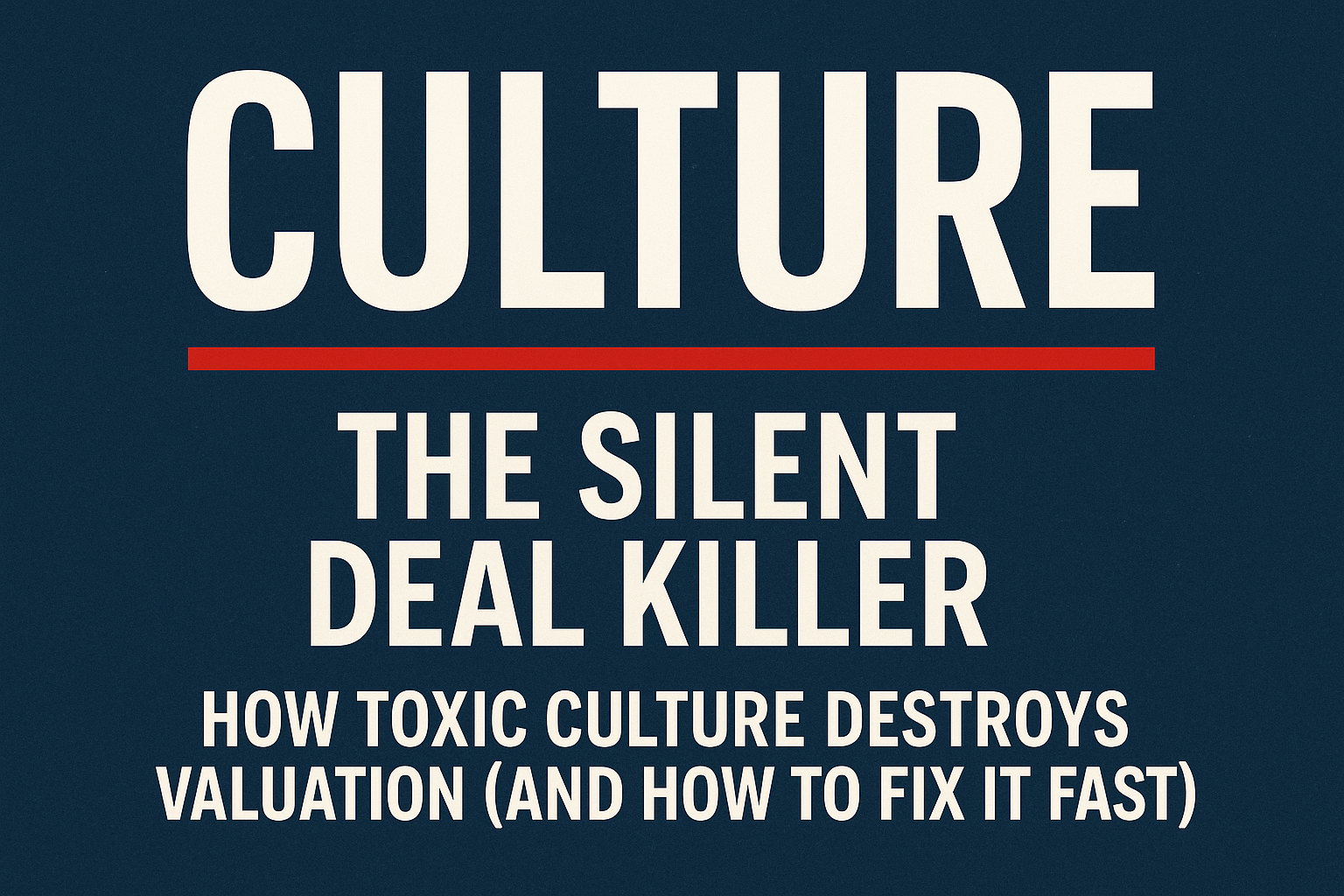The Silent Deal Killer: How Toxic Culture Destroys Valuation (And How to Fix It Fast)

Is your business culture quietly sabotaging the exit you've dreamed of for years?
Why Deals Collapse When Numbers Look Perfect
Imagine you’ve built your business from the ground up. Your financials are pristine, growth is strong, margins are healthy, and buyers are circling. Everything looks perfect, until silence. Suddenly, the buyer disappears. The calls stop. The emails dry up. The deal collapses without explanation.
This isn’t a nightmare. It’s reality for countless entrepreneurs who never see it coming. The killer isn’t your revenue. It isn’t your margins. It isn’t even the market. It’s your culture.
Jeffrey Feldberg calls it “The Silent Deal Killer.” Toxic culture lurks beneath the surface, invisible until a buyer peels back the layers. And when they do, the deal is dead.
Feldberg, drawing from his own battlefield scars, hammers home the point: ignore culture, and you're handing buyers a reason to run. He recounts how one offhand comment in a team interview can evaporate trust faster than a market crash. "The buyer disappears. No calls, no emails, no second chance," he warns. Busy entrepreneurs, this is your wake-up: culture isn't soft, it's the hard multiplier that either skyrockets your valuation or buries it.
The Subtle Signals Buyers Never Miss
Buyers are trained to spot risk. They don’t just analyze spreadsheets—they read people, processes, and energy. A disengaged employee in an interview. A casual comment about “firefighting every day.” A lack of alignment between leaders. These tiny signals scream dysfunction.
One entrepreneur learned this the hard way. During due diligence, a manager casually admitted that goals were unclear. To the founder, it was normal startup chaos. To the buyer, it was proof of instability. Overnight, trust evaporated. The deal collapsed.
Culture isn’t optional. It’s the foundation that multiplies value or destroys it.
Buyers aren't amateurs. They probe beyond spreadsheets, hunting for cracks in your foundation. Feldberg exposes the red flags you might dismiss as "normal"—high turnover you brush off, disengaged employees giving rehearsed answers, leaders spouting conflicting visions. These aren't minor glitches; they're deal-breakers signalling chaos that could implode post-acquisition.
In one raw anecdote, Feldberg shares a graduate's nightmare: a tech founder lost a life-changing offer when a manager casually revealed constant firefighting. To the entrepreneur, it was startup grit. To the buyer, it screamed risk. "Buyers see a house of cards," Feldberg stresses. The fix? Internal audits now. Email for that free checklist—uncover these toxins before they cost you millions.
The Buyer’s Lens: Trust Over Numbers
Numbers open the door, but culture closes the deal. Buyers ask questions like:
Can this business scale without the founder?
Are the team and leadership aligned?
Does the company radiate confidence—or chaos?
A thriving culture answers with strength. A toxic one whispers risk. Feldberg knows this firsthand. In his own 9-figure exit, buyers grilled his team, not just on revenue, but on collaboration, resilience, and alignment. It was culture that sealed the premium valuation.
When Culture Erodes Customers and Revenue
Your top clients love you, right? Revenue streams look bulletproof. But layer in toxic culture, and watch it all unravel. Feldberg dives into customer concentration: if 50% of revenue hinges on a few accounts, buyers already see fragility. Add disengaged teams cutting corners, and loyalty erodes overnight.
"Recurring revenue is platinum," Feldberg declares, but only if culture sustains it. In his Embanet saga, early chaos lost a key client—heart-sinking pain that forced a rebuild. Post-transformation, contracts locked in, churn plummeted. Entrepreneurs, this is actionable: align your team on customer care, and turn predictable cash into buyer confidence. Ignore it, and your "stable" base becomes a headache buyers won't touch.
Financial risk is amplified when culture is toxic. Customer concentration? It looks worse when service is sloppy or morale is low. Recurring revenue? It collapses when disengaged employees burn out clients.
On the flip side, a thriving culture transforms recurring revenue into recurring confidence. Buyers pay more because trust is high, loyalty is sticky, and risk is low.
One Deep Wealth graduate rebuilt his culture around shared values and accountability. The result? Churn dropped, recurring contracts grew, and buyers saw a resilient, scalable business worth paying a premium for.
Profit vs. Growth: The Cultural Trap
Too many entrepreneurs chase growth at the expense of profit. A $50M top line looks impressive—until margins vanish under the weight of chaos. Culture determines whether growth compounds into profit or evaporates into vanity.
Toxic cultures cut corners, balloon costs, and chase flashy revenue. Thriving cultures align teams, control expenses, and turn growth into sustainable profit. Buyers pay for profit, not vanity metrics.
Operational Chaos: The Mirror of Your Culture
Operations reveal everything. Feldberg warns: chaotic processes—fire drills, bottlenecks—mirror toxic culture. Buyers see it as un-scalable risk, slashing offers or bolting. "Document your SOPs," he urges, sharing how Embanet's early dependency on founders nearly tanked scalability.
One graduate's manufacturing mess—vague systems, over-reliance—killed a deal in diligence. Post-rebuild: efficiency exploded, morale surged. Entrepreneurs juggling fires, start small: one SOP this week. Turn chaos into control, proving your business thrives without you. Buyers pay premiums for that certainty.
The Quiet Red Flags That Buyers Spot
You may overlook them, but buyers never do. Feldberg warns of four silent killers:
Silent turnover: people leave quietly, one at a time.
Disengagement: employees avoid eye contact or give half-hearted answers.
Lack of alignment: managers contradict each other when asked about priorities.
Toxic influencers: high performers who poison culture while producing results.
These aren’t dramatic breakdowns. They’re subtle, deadly signals that scream risk. One buyer told Feldberg bluntly: “The numbers get us in the door, but it’s the culture that closes the deal.”
From Chaos to Control: Operational Culture
Your operations are a mirror of your culture. When accountability and alignment drive every action, efficiency soars. When chaos rules, fire drills multiply, and buyers see instability.
One entrepreneur discovered this during diligence when vague answers about processes shattered buyer confidence. Only after rebuilding her culture, documenting SOPs, and empowering leaders did efficiency return. Her valuation skyrocketed because buyers saw scalability, not chaos.
Three Cultural Multipliers That Protect Your Exit
Feldberg shares three proven strategies every entrepreneur can apply today:
Audit for toxins: Run a quick culture audit. Check turnover, survey employees, and uncover cracks before buyers do.
Build X-Factor values: Create cultural values that can’t be copied—like transparency, accountability, and customer focus. Systematize them, reward them, and celebrate them.
Reverse engineer buyers’ expectations: Document SOPs, showcase alignment, and tell a narrative that proves your culture isn’t talk, it’s repeatable and scalable.
Each multiplier transforms culture from a liability to a deal magnet.
Future Pacing: What Winning Looks Like
Picture due diligence where every team member delivers consistent, confident answers. Buyers lean in, smiling, because they see not just numbers but a machine powered by culture. Competing offers pile up, valuations rise, and you close not just any deal, but the best deal.
That’s the power of culture as a multiplier. It isn’t fantasy. Feldberg and countless Deep Wealth graduates have lived it.
Feldberg challenges entrepreneurs to act now:
Audit your culture before buyers do.
Build X-Factor values that lock in loyalty and profit.
Reverse engineer what buyers want so they see opportunity, not risk.
Culture isn’t just an exit strategy. It’s a business strategy that multiplies profits today while protecting tomorrow.
Closing Thoughts
If a buyer walked into your business today, what story would your culture tell? Would it whisper risk or shout opportunity?
Your legacy, valuation, and financial freedom depend on the answer. Don’t wait until due diligence exposes your blind spots. Prepare now.
Listen to the full episode of The Deep Wealth Podcast to discover the complete blueprint and join the entrepreneurs who are turning culture into their ultimate deal-making superpower.
Subscribe today because your next big breakthrough could be one episode away.
_**
What if 90 days was all it took to radically transform your business's profitability? Discover Deep Wealth Mastery, the only system derived from a 9-figure deal. Ready to welcome your financial freedom? Start your transformative journey today. Click here to start your journey**
















